
|
![]()
Greatest Films of the 1950s
1950 | 1951 | 1952 | 1953 | 1954 | 1955 | 1956 | 1957 | 1958 | 1959
Title Screen Film Genre(s), Title, Year, (Country), Length, Director, Description 


Animal Farm (1954, US-UK), 72 minutes, D: Joy Batchelor, John Halas
Halas and Batchelor's intelligent, British-American adult-oriented production was the first feature-length animated film (in general release) made in England. The animation was a visualization of George Orwell's "memorable fable" - a political and allegorical 1945 novella about farm animals (all voiced in the film by Maurice Denham), who suffered abuse and rebelled against their cruel and sadistic human owner - but their new, victorious revolutionary socialistic government led by a dictatorial, Stalinist leader became even more tyrannical. At the previously-thriving Manor Farm in the English countryside in the springtime, a farmyard's abused animals (representing Bolshevik and liberal revolutionaries) were being neglected and unfed by their mean and sadistic owner Mr. Jones. All of the disgruntled animals called for a secret meeting in the barn led by wise old prized boar-hog Old Major (representing Karl Marx and Vladimir Lenin). The meeting was attended by the strong, old and hard-working Boxer (a horse), his young friend Benjamin (a donkey), two other pigs: Snowball and Napoleon amongst other pigs, and many other animals. The aging Old Major (before his own predicted death) encouraged the other animals to overthrow their tyrant owner to gain their freedom. The infuriated animals determinedly broke into the locked-up supplies of grain and feed in the barn's storehouse. Mr. Jones gathered reinforcements from neighboring farmers with pitchforks and other implements to recapture his farm; the fighting was fierce, due to Snowball's organized offensive tactics and strategies, and the humans were ultimately forced to flee. Snowball (representing Leon Trosky) - the first leader of the new society (dubbed "ANIMAL FARM" - MANOR was crossed out), set up a new code of conduct in which the animals would all be equal, free, and happy. Five established Commandments or laws of the community were painted on the wall of the barn, including: "No Animal Shall Sleep in a Bed", "No Animal Shall Drink Alcohol", "Four Legs Good Two Legs Bad", "No Animal Shall Kill Another Animal", and "All Animals Are Equal." The farm lands became very productive and successful, especially due to the tireless efforts of workhorse Boxer and Benjamin. Snowball also suggested building a windmill as a way to generate and produce energy (electricity, heat, and light) to improve the animals' living conditions. The sly and devious Napoleon (with his second-in-command Fat Pig Squealer) secretly plotted against Snowball, with the backing of Napoleon's grown-up litter of powerful and obedient black guard dogs that served as his powerful security force. Napoleon criticized, heckled and voted down Snowball's plan as fanciful and nonsensical, and then ordered his trained, vicious and snarling dogs to attack and chase Snowball out into the snow and maul him to death. Then, he heartlessly became the new controlling, self-proclaimed leader of Animal Farm. He denounced Snowball as a traitor, and announced that he would serve as the sole animal to look after everyone and make all the decisions for the community. Then, Napoleon co-opted Snowball's energy-producing idea of a windmill as his own. The pigs would supervise the exhausting work to be conducted by all the other lower animals from dawn to dusk. Napoleon (and other pigs) were discovered sleeping in the beds in the farmhouse by Boxer and Benjamin, and a revised law appeared: "No Animal Shall Sleep in a Bed With Sheets." After establishing trade in town with Mr. Whymper, Napoleon conducted a 'show trial' (a Stalinist purge) for alleged, convicted traitors who didn't want their eggs confiscated (the hens, plus a sheep and a duck), who were forced to confess to their crimes (and charged with being "in league with Jones and Snowball") before they were executed by his pack of dogs (off-screen). Another commandment was amended (with the blood of the dead): "No Animal Shall Kill Another Animal Without Cause." The dictatorial Napoleon announced that the revolution was over and complete, and should be forgotten - and therefore the animals' revolutionary song was banned "under penalty of death." An attack on Animal Farm by Jones and other envious farmers was repelled by Napoleon's dogs, but many animals lay dead, and Boxer had been shot in the right leg. Over the next few years, the windmill was painstakingly rebuilt by the work animals led by the exhausted Boxer and Benjamin, as the gluttonous, autocratic Napoleon grew more and more obese in the farmhouse, and produced many lazy offspring. The exhausted and elderly Boxer was seriously wounded by a heavy block of rock that fell onto him during the windmill's re-construction. Napoleon and Squealer privately sold Boxer to Mr. Whymper's glue factory. When Boxer was taken away in a strange truck (not a veterinarian's vehicle or ambulance), the suspicious Benjamin protested and raced after the "death wagon," but failed to stop Boxer's slaughter. After drinking from a case of whiskey (payment for Boxer), another law had to be modified on the barn's wall: "No Animal Shall Drink Alcohol to Excess." As the film was concluding, more years went by and the windmill was completed, but the ascendant, thriving pigs still had unquestioned power over all the other animals whose lives had not improved. The pigs began to walk upright, dress in human clothing, drink whiskey, and treat the lower animals as slaves. 'Animal Farm' became a showplace for delegations of pigs that arrived to celebrate "the new era" and emulate its success. The animal leader Benjamin protested loudly that there was now only one law on the side of the barn, a modified Commandment: "All Animals Are Equal but Some Animals Are More Equal than Others"; Benjamin envisioned that the pigs had become like their original human oppressor, Mr. Jones. The animals knew that they must unite and gather at Animal Farm from all directions, and must rise up and revolt against their false utopian world. The film concluded with Benjamin leading an uprising. The lower farm animals vindictively marched on the Jones' farmhouse, broke through barriers, smashed Napoleon's portrait, and trampled Napoleon and his pig cohorts to death before reclaiming the farm and overthrowing the autocracy.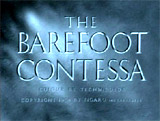

The Barefoot Contessa (1954, US/It.), 128 minutes, D: Joseph L. Mankiewicz
Writer/director Joseph L. Mankiewicz's cautionary showbiz melodrama and cynical depiction of Hollywood (conveyed through a rich script), with gorgeous Technicolored cinematography by Jack Cardiff, was his first film for his own independent production company Figaro, Inc. - financially backed by United Artists. It told a "Cinderella tale" about the tragic life of the fictional title character - a Spanish sex symbol. The misogynistic and depressing film pushed the boundaries of the Production Code, with its themes of an independent female destroyed by stardom, unfaithful sex leading to pregnancy, and her punishment by an insecure and impotent male. The structure of the film was composed of many flashbacks (with voice-over narration provided by three main male characters) reaching back to three years earlier and providing different perspectives (similar to Citizen Kane (1941) and Rashomon (1950, Jp.)), to survey the short life and loves of Maria Vargas (Ava Gardner) (aka film star Maria D'Amata). She was noted for being a flamenco dancer who was often "barefoot." In the tragic rags-to-riches story, the peasant-born Maria was 'discovered', became a movie star, and rose from poverty to become Italian Countess Torlato-Favrini. The opening introductory voice-over narration occurred at Maria's rain-soaked funeral on the Italian Riviera, delivered by washed-up, world-weary, recovering alcoholic and has-been American writer/director Harry Dawes (Humphrey Bogart). The hang-dog character spoke about the mythic title character. In the first flashback set in a crowded Madrid cabaret-nightclub before a hypnotized audience, little-known Maria Vargas performed a flamenco dance (off-screen). The film's three main characters were introduced in the nightclub, scouting for a possible glamorous actress for their future movie production. They had just missed Maria's sole dance performance for the night: movie tycoon-producer (similar to Howard Hughes) and "Wall Street wizard" Kirk Edwards (Warren Stevens), Dawes (who had been hired to write and direct Edwards' first film production), and Edwards' heavily-sweating, slimy press agent - Hollywood studio and PR man Oscar Muldoon (Oscar-winning Edmond O'Brien) - the three were interested in enticing Maria (as a "new face") to appear in Edwards' first movie production: Black Dawn. Backstage in her dressing room and later at her humble family's home, Dawes enticed Maria to audition for a 'screen test' in Rome - to be a star in his next movie. Assured that Dawes would be her platonic and protective mentor, Maria agreed to the screen test and easily passed. Muldoon remembered how she had attended the US premiere of her first film - unescorted - unlike most starlets. Maria's first film was a major hit and she emerged as a huge international movie star. PR publicist Muldoon became worried about negative PR and box-office losses when Maria chose to fly from Hollywood to Spain to appear in court to passionately defend her infirm father (Renato Chiantoni) who had been accused of murdering (by strangulation) her abusive mother (Maria Zanoli). His fears were unfounded - her raw testimony in court made her an even bigger and more popular star. Two years later during Edwards' hosted party in her rented Hollywood home, Maria fell for one of Edwards' invited guests - rich millionaire and Latin American playboy Alberto Bravano (Marius Goring). She had become restless in Hollywood after making three films with Harry and her bankrolling producer Edwards; Maria considered herself to now have a 'Cinderella' life, but there was no Prince in her life. Against Harry's advice, Maria followed Alberto back to Madrid, and joined his international jet-setters to cruise on his white yacht on the French Riviera. The opportunistic Muldoon told Harry that he had also maneuvered to switch his allegiance away from Edwards after four years of slaving for him, to provide public relations for the ultra-rich Alberto overseas. Unfortunately, Maria's pairing with Bravano remained shallow and not fully satisfying: ("She showed no pain, no pleasure, no interest. No nothing"). And then one night in a luxurious French Riviera casino, the "half-crazy" Alberto embarrassingly and abusively accused Maria of stealing from him, causing him bad luck and putting a "curse" on him. She was rescued by wealthy Italian Count Vincenzo Torlato-Favrini (Rossano Brazzi), who had earlier in the day seen Maria in the open outdoors of an olive grove in a French gypsy camp on the border with Italy, as she performed a flamenco dance. With her happy permission, the Count drove Maria to his magnificent Italian palazzo villa in Rapallo, where he introduced her to his widowed sister Eleanora (Valentina Cortese). Later during a private and cryptic conversation, Eleanora told Vincenzo that she objected to her brother's plans for a wedding to Maria and told him that he was being unfair, and "senselessly cruel and destructive" to her. After a six-week courtship, the two were married. About three months later in Italy in Harry's hotel room, a week before her death, Maria visited with Harry and told him (visualized in a brief flashback) the devastating details of her wedding night. The Count had informed her that he was impotent (the result of a severe WWII wound-injury in 1942) and could not provide her with offspring. Maria told the incredulous Harry that she was planning to inform Vincenzo the next day that to satisfy herself - and also to please him, she had taken it upon herself to continue his family's blood line - and had already become pregnant (with the villa's chauffeur). Afterwards, Harry was unable to prevent a tragic murder sequence from occurring, as he raced after Maria to the villa. The jealous and suspicious Count assumed that she was having an affair with the chauffeur and didn't realize that Maria had already become pregnant and wanted to give him a child fathered by someone else. Before she was able to explain herself, Vincenzo killed both of them with two gun shots (off-screen), and then summoned the police. The film concluded with mourners departing at the end of the funeral (as the rain stopped); the sun shone on the previously rain-drenched stone statue of the barefoot Maria (as a marker for her grave in the villa's garden).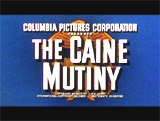



The Caine Mutiny (1954), 125 minutes, D: Edward Dmytryk
Director Edward Dmytryk's war-time military drama was based upon Herman Wouk's best-selling and Pulitzer Prize-winning novel The Caine Mutiny published in 1951. In the plot, young and inexperienced Princeton graduate Ensign Willie Keith (Robert Francis) told how he was assigned to a dilapidated and rusty destroyer-minesweeper named the USS Caine, newly appointed and captained by stern disciplinarian Lt. Commander Francis Philip Queeg (Oscar-nominated Humphrey Bogart). Queeg reprimanded the crew for messy shirttails, haircuts, and other petty things, and soon it was apparent he might be paranoid, irrational, eccentric, and mentally unbalanced - possibly due to long and arduous combat duty. The Captain began to demonstrate how disturbed he was, especially during a beach-landing incident in which he was dubbed "Old Yellowstain" (named after the yellow dye marker used to indicate the landing zone) for his alleged cowardice. The question arose: Could the naval officers take control of the ship, without being accused of mutiny? The last straw was Queeg's incompetence and mis-treatment of a minor incident involving the disappearance of a quart of leftover strawberries in the officer's mess, and when Queeg mismanaged the course of the ship during a typhoon and executive officer Lt. Steve Maryk (Van Johnson) stepped in and took charge. Steve Maryk and Willie Keith were court-martialed for mutiny, to be defended by counselor Lt. Barney Greenwald (Jose Ferrer). Cynical novelist and communications officer Lt. Tom Keefer (Fred MacMurray) testified that taking the ship from Queeg was in error, to save himself. The prosecution's case faltered when Queeg was cross-examined, and he became agitated, frantic, anxious, and paranoid, and blamed everyone for the Caine's problems, while nervously rolling clanking steel balls in his hand - a habit that he had developed. He also rambled on to defend himself - displaying his obviously unbalanced nature. The two officers were acquitted, and afterwards during a celebration of their case, a drunken Lt. Greenwald Barney argued that the officers should have supported Queeg, and then accused Lt. Keefer of being the true instigator and mutineer of the Caine.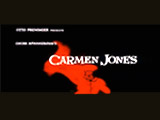


Carmen Jones (1954), 105 minutes, D: Otto Preminger
Daring, risk-taking director Otto Preminger's musical film (for Fox Studios) of seductive passion, obsession, and murder was remarkable for its all-black cast and its original and exciting premise. The basis of the film was Georges Bizet's 1875 opera Carmen, refitted for the big screen as a romantic musical, transposing the tale from 19th century Spain to the WWII era in the US, with the main cast composed of African-Americans who were stationed at a military base. In the film's opening, virtuous, hometown sweetheart and girlfriend Cindy Lou (Olga James) arrived at a parachute-making plant next to an army camp. She was there to meet her fiancee - handsome, honorable military Corporal Joe (Harry Belafonte). Within 24 hours, Joe was scheduled to leave for officers' flying school, to become a paratrooper trainee destined to be a fighter pilot ("fly boy") to fight in the war, and he proposed that he and Cindy Lou get married just before his departure. Meanwhile, the free-spirited, femme fatale title character Carmen Jones (Oscar-nominated Dorothy Dandridge in a career-defining role) was introduced as a carnal, red-hot, free-spirited factory civilian employee. After brawling with a co-worker, she was arrested, and Joe's spiteful superior officer Sgt. Brown (Brock Peters) ordered the off-duty soldier to transport Carmen as a military prisoner to a civilian judge in Masonville over 50 miles away, to sentence and punish her. On their way to Masonville after a series of misadventures, the two ended up at the shack of Carmen's grandmother - and the seductive Carmen and Joe made love (off-screen). The next morning, however, she escaped with a farewell note telling him of her love. Joe was subsequently court-martialed, demoted to private, and placed in a stockade. Cindy Lou visited Joe a few weeks later when a package was delivered to him from Carmen - containing another love note and a cut rose-flower. Disgusted, Cindy Lou departed. While awaiting Joe's release, Carmen hung out for him at Billy Pastor's Cafe in Louisiana. Once wealthy Chicago heavyweight prize-fighter Husky Miller (Joe Adams) saw Carmen at the Cafe, he desired her, and bribed Carmen's friends Frankie (Pearl Bailey) and Myrt (Diahann Carroll) to also entice the very reluctant Carmen to join them on the train to Chicago. She refused, and then Joe suddenly arrived at the Cafe, but he told Carmen that he had to get back to the base to take a bus and report for attendance at flying school 400 miles away. To spite Joe, Carmen decided to accept an offer to accompany Joe's superior officer Sgt. Brown for the evening, inciting Joe's angry and jealous lust. After a fistfight with Brown who was "hurt real bad," Carmen suggested that Joe desert his regiment and go AWOL to avoid detainment by the MPs (military police) and an inevitable 4-year jail term. The two ended up on Husky's train to Chicago. Once there, Joe was forced to seclude himself and hide out with Carmen from MP's in a shabby rented Chicago apartment, while she was free to come and go. Once their money started to dry up, Carmen was eventually enticed by her friend Frankie to join her at Husky's luxury hotel suite, and live a better life. It marked the declining end of their ill-fated affair when Carmen tired of Joe and deserted him. She chose to become romantically-involved with Husky, who offered her clothes and diamonds and material comforts. While the MPs closed in on him, Joe located Carmen at Husky's training facility and ordered Carmen to leave with him. After he called her "a double-crossin' tramp," she refused to join him, and he was forced to flee when two MPs approached. The film's tragic conclusion was set at an arena where Husky defeated his opponent in the ring in two rounds. In the audience, Joe - in a jealous rage - grabbed Carmen from the arena's crowd and pushed her into a store room. He begged for her to return to him, but she rebuffed him and claimed that what they had was over and there was no going back for them. Joe gave her the option of death or freedom: ("I'll have no man laugh at me while you're rollin' around in his arms. Stay with me, or I'll kill you"), and she decided: "OK, kill me now, or let me go." He chose to strangle her to death. After murdering her, the MPs arrived to arrest Joe.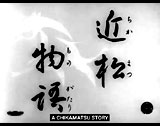


Chikamatsu Monogatari (1954, Jp.) (aka The Crucified Lovers, or A Chikamatsu Story), 102 minutes, D: Kenji Mizoguchi
Director Mizoguchi's romantic drama, based on a 1715 Japanese puppet theatre play (bunraka or jurori), was a passionate tale of star-crossed lovers involved in a forbidden adulterous love affair that also involved financial scandal, jealousy and rigid feudal duties, roles, and social norms. The film opened in feudal Japan in 1693 in Kyoto, at the scroll-making, printing factory of wealthy miserly, but reputable older nobleman Ishun (Eitaro Shindo). His business included an exclusive contract for the Royal Palace's calendars, and he was nervous about any scandal or gossip in the business community that would ruin his prosperity. Meanwhile, Ishun's younger wife Osan (Kyoko Kagawa) was approached by her indebted brother Gifuya Dôki (Haruo Tanaka) for a monetary loan of five kan (five gold coins, a very small amount). To prevent scandal regarding her family's finances, Osan was too embarrassed to ask her stingy husband for the money. Meanwhile, Ishun was pressuring his young maid Otama (Yôko Minamida) to be his mistress by sexually advancing on her, when he would periodically visit her room to ply her with promises of wealth. Otama claimed, deceptively to avoid him, that she was "engaged and getting married" to Mohei (Kazuo Hasegawa), Ishun's top employee and meek trusted apprentice-assistant. Otama and Mohei agreed that telling Osan about her profligate husband's infidelity would cause an unwanted scandal and ruin the family's reputation. Osan asked a favor of Mohei who took care of her husband's business accounts - to acquire the money to pay her brother's debt. Mohei made an attempt to steal some of Ishun's money by putting his master's seal on a blank monetary payment note. However, he was seen by greedy head clerk Sukeimon (Saka Ozawa) (who asked for half of the amount to keep quiet). Mohei decided to come clean and reported directly to Ishun, by openly presenting his master with the blank note and requesting a loan. Mohei was unjustly accused of wrongdoing, even though Otama claimed that she was the one who had asked Mohei to lend her the money (for her old jobless and suicidal samurai uncle), and Osan begged her husband to take pity. However, Mohei confessed to the fraud-crime. Ishun had finally found his opportunity to punish his romantic rival (for Otama's romantic interest): "These two are in love and they betrayed me!" - he exclaimed. After being intensely humiliated, Mohei was cruelly punished by Ishun and locked up in a hatch within a storeroom. Osan came to Otama to apologize ("It was all my fault") and thank her for trying to help shield Mohei from Ishun's anger; she was surprised when Otama told her that her husband had been trying to sexually abuse her. To catch her husband sneaking into Otama's bedroom, Osan took Otama's place for the night. Mohei escaped that evening and crept into Otama's dark night chamber to thank her, and was totally shocked when in the light, he realized he was speaking to Osan. She explained she was there to catch her cheating husband "red-handed." She blamed herself for Mohei's predicament, before he fled to save himself after Sukeimon reported that he saw him speaking to Osan. Due to misunderstandings and the chain of events, Ishun now suspected a secret and illicit relationship between his wife Osan and Mohei, and accused her of infidelity. Both Osan and Mohei escaped to evade police (Mohei had already been accused of stealing Ishun's seal). She realized her husband was duplicitous, but unfortunately, their flight actually implicated the two as adulterous lovers, and Mohei worried: "They're going to crucify us." Adultery was actually punishable by crucifixion. There were concerns in many places that if the two were found by police, they would be charged as adulterers, and related houses would suffer with the loss of "dignity" and assets. The couple fled together to the mountainous area around Lake Biwa. In the film's most dramatic scene, Osan considered committing suicide by having Mohei bind her legs and throw her into Lake Biwa; as he was preparing her for death, he confessed his love for her: "I have always loved you with all my being"; she responded that what he had told her changed things - they truly loved each other and must remain alive: "What you just said changed everything...I don't want to die anymore. I want to live!" After evading authorities for awhile, the two lovers were reunited at her family's home, where Osan vowed: "We will never part again." Again, they fled from Kyoto police, but were caught and voluntarily confessed to the crime of adultery. In the film's downbeat conclusion, government officials found Ishun guilty of deception: (he had "failed to report the crime of adultery pertaining to his wife and employee Mohei"); the government punished him by seizing and confiscating his property, and banishing him to exile (along with Sukeimon for his dishonesty). The two adulterers (holding hands together) were paraded through town on horseback on their way to being crucified - they were happily holding hands.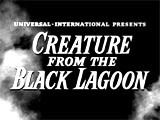

Creature from the Black Lagoon (1954), 79 minutes, D: Jack Arnold
This classic Universal creature-horror film by director Jack Arnold was originally shot in 3-D, and the last great prototypical classic from Universal Studios. The campy film began with a voice-over from a narrator (Art Gilmore) reading from the Biblical book of Genesis. A startling discovery was made in an upper Amazonian jungle in Brazil of a fossilized claw or hand (with webbed fingers) embedded in rock by Dr. Carl Maia (Antonio Moren). On his way to the Institute of Maritime Biology at Morajo Bay in Brazil with his amazing fossil find, Dr. Maia met with another scientist, ichthyologist Dr. David Reed (Richard Carlson), who was studying specimens of lung-fish. Reed was one of Dr. Maia's previous students. He was accompanied by his dark-haired girlfriend-fiancee and research colleague Kay Lawrence (Julia Adams). Back in the Amazon jungle campsite, Dr. Maia's two local assistants, Tomas (Perry Lopez) and Luis (Rodd Redwing), were suddenly attacked by a humanoid creature (seen with a disembodied claw). An anthropological expeditionary group was quickly organized by Dr. Maia and funded by Reed's boss Dr. Mark Williams (Richard Denning), to journey back on the Brazilian river into the Amazon on board the dilapidated Rita. Once the group arrived at Dr. Maia's campsite, they discovered the destroyed campsite and the two dead assistants. It was eventually discovered that a prehistoric web-fingered Gill-Man (Ben Chapman) could be found in a dark unexplored lagoon downstream known as the "Black Lagoon." As the scuba-diving Reed and Williams gathered rock samples underwater, they were unaware that they were being stalked and watched by the Gill-Man. In a scary and superbly-photographed underwater sequence, the creature expressed 'Beauty-and-the-Beast' love interest in bathing beauty Kay, stalking and watching her from below as she swam above him in a white one-piece suit. After some deadly encounters with the aggressive Gill-Man, and two more crew members were killed and scientist Dr. Edwin Thompson (Whit Bissell) was seriously wounded, the group was compelled to depart, but discovered that the Creature had deliberately blockaded their exit from the Black Lagoon. Underwater, as Reed tried to clear the blocked passage a second time, Williams approached with the spear-gun and hit the Gill-Man in the abdomen. Reed watched from nearby as the Creature dragged Williams down and mauled him to death. The Creature was also able to climb on board and reach in through a porthole in an attempt to attack the bandaged and ailing Dr. Thompson. As the crew was then distracted while working to clear the blockade, suddenly, Kay was grabbed and kidnapped from the boat. The Creature dove back into the water with her and took her to its swampy cave or grotto hidden by the bank. Dr. Reed with a spear-gun came to Kay's rescue. As the Creature was attacking Dr. Reed and Kay was cowering nearby, it was shot with bullets (by Dr. Maia and Captain Lucas) and severely injured in the chest with multiple bullet wounds. Dr. Reed allowed the Creature to retreat back to the lagoon's beach ("Let him go") where it swam off, disappeared, and sank lifelessly back into the deep watery depths of the lagoon.


Dial M for Murder (1954), 105 minutes, D: Alfred Hitchcock
This was Hitchcock's screen version of English playwright Frederick Knott's successful stage play. It was filmed in 3-D with the technology that was available at the time, and judged as one of the greatest 3D films ever made. [Note: It was remade as A Perfect Murder (1998).] Hitchcock's crime-thriller and mystery masterpiece told about a charming, sophisticated yet villainous husband - an ex-tennis pro named Tony Wendice (Ray Milland), who masterminded the murder of his unfaithful wealthy socialite wife Margot Wendice (Grace Kelly) for having an affair with American crime-mystery writer Mark Halliday (Robert Cummings), so that he could inherit her fortune. Wendice blackmailed or "influenced" C.A. Swann/Captain Lesgate (Anthony Dawson), a former classmate with a petty-criminal record, to commit her "perfect murder" for £1,000 pounds cash. During the attempted strangulation scene, the tension was ratcheted up. Tony's plan was to have his wife leave her bedroom to answer the living room phone, to enable Swann to strangle her from behind the drawn window curtains where he was hiding. In one of the most suspenseful scenes, Tony dialed his home number (dialing M for murder) from a hotel lobby's payphone, but because his watch had unexpectedly stopped, he was about eight minutes too late. Tension was intensified and his plan was botched because he was planning to call at 11:00 pm, but the call was at about 11:08 pm. The assassin was frazzled and about to leave because of the delay. When the phone finally rang, the camera slowly panned to the left around Margot as she came into the living room and answered. The camera moved to view Swann's position behind the living room curtains. He approached with a twisted scarf and wrapped it around her neck, but she foiled his strong attack by fighting back. She reached behind her - searching for a weapon (a pair of scissors) to defend herself and then killed the assassin by stabbing him in the back. Tony's new plan to outwit the police seemed to succeed - making it appear that Margot had an ulterior motive for killing Swann (he made it appear that Swann was blackmailing her), and she was rapidly brought to trial and convicted. However, there were anomalies in Tony's story that didn't add up (mixed up keys, switched raincoats, etc.), and wily Inspector Hubbard (John Williams) was on the case. His objective was to prove Margot's innocence and establish Tony's guilt. During much of the second half of the film, Mark theorized or speculated with Tony about what actually happened to save Margot's life, and in fact, his theory was extremely close to the truth - that Tony had paid Swann to kill his wife Margot. Tony blamed Margot for an attache case with 'blackmail' money to pay off Swann, but she claimed she knew nothing about it. In the concluding scene, Hubbard had set up a trap for Tony after he found that Tony had hidden Margot's stolen front-door key in the hallway - and it was still there; he showed the key to the astonished Mark and Margot. The guilty Tony opened the door with the crucial duplicate latchkey (using Margot's front-door key that he had stolen from her handbag, and then planted for Swann's use) that Swann had earlier retrieved from under the carpet on the 5th step of the stairs outside the apartment. That was the reason why there was no key found on the dead assassin Swann (and there was no forced entry either, because he didn't have mud on his shoes) - Swann had entered using the planted key and immediately replaced it under the stairs' rug. When Tony entered (using the key under the carpet stairs) and turned, he realized that he had been found out: (The Inspector predicted Tony's downfall: "Once he opens that door, we shall know everything"). As the lights went on inside the apartment (symbolic of his revealed crime), he turned and found himself face-to-face with the Inspector, Margot and Mark waiting inside. With restrained British reserve, Tony congratulated the Inspector for solving the case.
The Far Country (1954), 97 minutes, D: Anthony Mann
This dark revenge western was the fourth pairing of director Anthony Mann with actor James Stewart, in films between 1950 and 1955. The script was written by Borden Chase. It was filmed in Technicolor in the Great Canadian Northwest. The setting was In 1896, during a cattle drive into the 'far country,' from Wyoming to Seattle, and then to the port city of Scagway (in the Alaskan Panhandle), and further northward into Canada to Dawson City (in the Canadian territory of the Yukon). During the Klondike Gold Rush, self-reliant, misanthropic anti-hero cattle herder and loner Jeff Webster (James Stewart) (advertised as a "stranger with a gun") and his trusted, grizzly sidekick pal Ben Tatum (Walter Brennan) were herding their cattle from Wyoming, with Ben's ultimate objective to fund their dream ranch in Utah. The film opened in the coastal city of Seattle, where Webster directed his cattle onto a steamship bound to the North, after being accused by two cowhands of unlawfully murdering two other cattle thieves. Upon their arrival in Scagway, the two interrupted a hanging on a platform erected in the town's streets, being conducted by the film's despotic antagonist: wealthy yet affable top-hatted judge/Sheriff Gannon (John McIntire). The self-appointed Gannon arrested Webster on false charges, and then held a bogus and unfair trial in the saloon of seductress Ronda Castle (Ruth Roman), who was one of Gannon's corrupt business associates. (The seductress had earlier helped shelter Jeff from authorities onboard the steamship in her stateroom's bed, and she had taken a liking to him.) The annoyed and tyrannical judge, who was quoted as saying: "I'm gonna like you. I'm gonna hang you but I'm gonna like you," acquitted Jeff of the murder of two cattle thieves, but then confiscated Webster's entire herd for the crime of disturbing the peace in town. However, within a short time, Webster and Tatum were hired by Ronda to lead a caravan to the lawless, isolated, gold-rush settlement town of Dawson City. During their first night, their ploy to steal back their herd of animals succeeded, and they were able to find refuge outside of Gannon's jurisdiction across the border in Canada. After reacquiring his herd, Jeff was threatened by the perturbed scoundrel Gannon that he would be hanged if he ever returned south thru Skagway. During their further trek northward, Jeff insised on taking a diversionary valley trail with his cattle, while he watched Ronda and the others take a faster, more treacherous mountainous 2-Mille Pass trail prone to avalanche - without warning her. After begrudgingly being forced to rescue her, the caravan finally arrived in Dawson City, Yukon, featuring a local hash house with bear stew, a school and a community church. To his greedy surprise, Jeff was able to auction off his herd for a high bid of $40,000. The surprising highest bidder was Ronda, who outbid the lower offer of the co-owners of the hash house. As a new arrival in town, the savvy, strong-willed entrepreneur was opening up a saloon known as Dawson Castle, in partnership with Gannon, that would inevitably usher in more lawlessness and greedy corruption. With her advantages of endless cash and beef, the self-interested Ronda would become the new overlord of the town. Jeff was determined to resist the amorous, love-triangle intentions of both 'bad girl' Ronda and a pigtailed, tomboyish, freckly-faced French-Canadian immigrant named Renee Vallon (Corinne Calvet). He also urged the townsfolk to avoid conflict and withdraw from interfering, rather than opposing Gannon and his henchmen. With their cash, Jeff and Tatum bought an existing gold mine claim, and were planning to evade Gannon and his hired men and leave town, but Tatum inadvertently and foolishly tipped them off (by buying extra coffee for the long trip). As the two men were by their river escape route by raft, they were attacked and robbed - Tatum was shot dead while Jeff's right hand was hit and incapacitated. After returning to Dawson where he was cared for by Renee, he now chose to participate in an inevitable shoot-out between himself and the villainous Gannon and his lawless men. Jeff's tiny bell on his horse Pie's saddle-horn announced his arrival for a showdown. He held his Winchester rifle across his injured arm with his left hand, to take a stand with the community's residents (intimidated, powerless and persecuted miners) against the cheating Gannon and his gang led by Madden (Robert J. Wilke) and Newberry (Jack Elam). Jeff evaded a surprise ambush by the two henchmen, but as Ronda ran out into the street to warn him, she was lethally shot in the back by Gannon. Jeff fired back at Gannon under the saloon's porch floorboards and killed him. He was supported by the armed and courageous townfolk, to take back their city.


Gojira (1954, Jp.) (aka Godzilla), 96 minutes, D: Ishirô Honda
The influential classic Japanese horror film, with effective special effects, was later released in 1956 as a shortened, re-edited Americanized version (with Raymond Burr as US reporter Steve Martin). The film served as an allegory for the Hiroshima and Nagasaki attacks almost 10 years earlier. In the original 1954 Japanese film, Godzilla was a dormant (but revived) giant, fire-breathing, dinosaur-like, reptilian monster/creature. It had been awakened, irradiated and mutated by atomic H-Bomb tests in the ocean, revealed when ocean waters turned boiling hot. In the area near Odo Island, two mysterious, devastating explosions (signaled by a flash of light) and boiling water destroyed two Japanese freighters. A fishing boat that rescued some survivors also sank. A superstitious, villager-inhabitant elder blamed everything on the ancient legend of a creature named Godzilla ("I knew it. It must be Godzilla") - an enormous, destructive and ancient sea creature. The devastated residents of Odo Island, after the destruction of their fishing industry, demanded disaster relief in Tokyo. Paleontologist Professor Kyohei Yamane (Takashi Shimura) ordered an emergency research team to the island to immediately investigate; a research vessel was quickly dispatched (including Yamane with his daughter Emiko (Momoko Kōchi) and her new fiancee, South Seas Salvage ship captain Hideto Ogata (Akira Takarada) on board). On the island, traces of radioactivity were discovered, plus the presence of a giant ancient dinosaur (with radioactive footprints) was hypothesized. The monstrous Godzilla was briefly sighted - Yamane called it "a creature from the Jurassic era" that was emitting high levels of H-bomb radiation. He theorized that Godzilla had appeared in Japan's territorial waters only after being awakened in its sea cave "sanctuary" by repeated underwater H-bomb testing in the Pacific region. Dr. Yamane was more interested in studying, understanding and researching Godzilla (and understanding its resistance to radiation) rather than killing him - and actually admitted that Godzilla was invincible. It was rumored that Dr. Daisuke Serizawa (Akihiko Hirata), a reclusive colleague of Emiko's father, and Emiko's ex-fiancee, was working on a Godzilla-related secret project ("a major breakthrough in defeating Godzilla") at his research laboratory. He privately demonstrated his secret weapon to Emiko that he had devised to destroy Godzilla - but only if she promised to keep quiet: ("you mustn't tell a soul"). She was horrified by what she saw (OFFSCREEN, a tank full of fish were turned to skeletons in mere seconds) - she covered her eyes, and screamed. The beast further rampaged through mid-50s Tokyo Bay and then the ward-city of Shinagawa. A barbed-wire security barrier (100 feet high and 165 feet deep) was constructed along the entire Tokyo-Yokahama coast and then electrified with 50,000 volts, but it proved ineffective when Godzilla continued to ravage the city of Tokyo by producing huge fires and "a sea of flames" everywhere, before retreating back to the ocean. During a flashback sequence, Emiko divulged to her fiancee Ogata what she had actually seen in Dr. Serizawa's laboratory. He had developed a device known as an "Oxygen Destroyer" that sucked all the oxygen from an aquarium water tank filled with fish, asphyxiating and then liquefying the living creatures instantly. In the flashback, Serizawa explained to Emiko how he was reluctant to use the device against the kaiju, knowing that its potential power could destroy all of mankind. After the flashback ended, Ogata and Emiko approached and confronted the scientist, begging him to save humanity. Serizawa decided that he must destroy his research documents and lab notes-materials in order to prevent the Oxygen Destroyer from getting into the wrong hands, but he still feared that he had knowledge of the device's construction in his head. After he agreed to use the superweapon, a naval ship transported Ogata and Serizawa near to Godzilla's last known location, using a radiation Geiger counter. The device was taken into Tokyo Bay on a naval ship. Ogata and Serizawa wore diving suits to plant the Oxygen Destroyer deep into the water. Ogata surfaced as Godzilla approached, when Serizawa unexpectedly decided to deliberately sacrifice himself (to save humanity from further destruction if the horrible weapon's plans were revealed to the world's superpowers). Alone, he released and detonated his device underwater and cut his own diving suit's air-hose - killing both Godzilla and himself. The film concluded with Dr. Yamane's cautionary final statement of his worries on the deck: "I can't believe that Godzilla was the last of his species. If nuclear testing continues, then someday, somewhere in the world, another Godzilla may appear."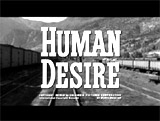


Human Desire (1954) (aka The Human Beast), 91 minutes, D: Fritz Lang
Fritz Lang's grim, noirish, melodramatic tale of fate, infidelity, blackmail and obsessive passion was based on Emile Zola's 1890 novel La Bete Humaine. This remake was already filmed twice before: the silent film Die Bestie im Menschen (1920, Germ.) and Jean Renoir's French film La Bête Humaine (1938, Fr.) (aka The Human Beast). After three years of service, returning Korean War veteran and train engineer Jeff Warren (Glenn Ford) was beginning to adjust to life on the homefront and work in New Jersey for the railroad. Jeff was introduced on the job to the assistant railway yardmaster Carl Buckley (Broderick Crawford) - he was a violence-prone, moody, brutish, abusively sloppy drunk and depressed older man. Carl had recently married a trophy wife - no-good femme fatale Vicki Buckley (Gloria Grahame), an amoral, erotic, brassy, manipulative and sexually-frustrated, unloved wife (described in the film's tagline as: "She was born to be bad...to be kissed...to make trouble!"). Due to his quick anger, Carl was fired from his job for his insubordination toward his boss John Thurston (Carl Lee). He pressured his wife Vicki to intervene with powerful John Owens (Grandon Hughes), her mother's former boss and a childhood acquaintance, to restore his job. Owens was an influential and powerful businessman who conducted alot of shipping business with the railroad. In NYC, Vicki met with Owens over a period of five hours, and the brutish and jealous Carl suspected that she had slept with him in exchange for favors. The black-hearted, vengeful Carl forced Vicki to confess to adulterous infidelity, and pressured her to hand-write an intimate message to Owens who was due to take the night train to Chicago. Vicki requested another rendezvous-meeting with Owens that evening in his sleeping car train compartment. It was part of Carl's devious plan to stalk and then murder Owens with a knife in the train compartment. The murder occurred off-screen behind the compartment's door. The crime scene was made to look like a robbery had been committed; Carl took Owens' wallet and his pocket-watch - and he also removed Vicki's incriminating message. On the same train during the murder, the off-duty Jeff witnessed that Vicki was present at the murder scene, and he became inextricably involved in the crime. Carl had instructed Vicki to distractedly seduce Jeff so that Carl could escape unnoticed. Later, Carl blackmailed Vicki when he threatened to take the message to the police if Vicki accused him of the lethal stabbing. Jeff was immediately attracted to Vicki when she followed Carl's orders inside Jeff's compartment. Afterwards, Carl refused to burn the message: ("This letter is gonna keep us together. There's not gonna be anybody else, Vicki"). During the subsequent trial, Jeff protectively avoided identifying Vicki as the passenger he saw near Owens' compartment. Soon, Vicki was confessing to Jeff how her abusive marriage was crumbling and together, they entered into a passionate adulterous affair. Jeff knew he was getting embroiled into something dangerous that could incriminate him as an accomplice to the crime. Vicki again lied to Jeff and told him that her alleged affair with Owens didn't happen, even though she told him that under pressure when beaten by Carl, she had blurted out that it was true. Jeff's libidinous desire for her led him to try to work things out with Vicki. When Carl was again fired from his job, Vicki told Jeff about her newest predicament, and planted a murderous seed in Jeff's head, suggesting that Carl might have an accident in the yard, to prevent Carl from continuing to threaten blackmail toward her. That evening, Jeff was tempted to nearly kill her violence-prone, drunken, and unstable husband, but then he relented and failed to carry through on murder, but he was able to take the letter from Carl's pocket. Jeff accused Vicki of playing him for a fool, making him lie on the stand, and then deceiving him and setting him up as Carl's murderer. Jeff decided to end their affair and reject her ("It is finished") - he felt completely manipulated and used - and gave up on her, but before leaving, he gave her the black-mail message. In the film's doom-laden, deadly conclusion, as the jilted Vicki was riding on Jeff's train to leave town, Carl entered her compartment and begged her to not desert him; he also offered to give her back the message - but she snapped back that he couldn't bargain with her because the letter was no longer in his possession. Carl accused her of infidelity with Jeff, but she claimed she was leaving on her own. She taunted him by admitting her affair with Jeff and that she had enjoyed seducing Owens to reacquire Carl's job. Insanely jealous, Carl then strangled Vicki to death.



Johnny Guitar (1954), 110 minutes, D: Nicholas Ray
Nicholas Ray's off-beat Western and bizarre psychological film for Republic Pictures was often called a 'lesbian western' (with major role-reversals) and a visually-excessive melodrama. In the 1800s, gun-crazed drifter and reformed gunslinger Johnny "Guitar" Logan (Sterling Hayden) with a guitar strung over his shoulder, arrived in a small Arizona cattle town and entered into Vienna's - a deserted gambling saloon. Its owner was non-conformist, strong-willed Vienna (Joan Crawford) who had built the saloon on the outskirts of town in lucrative anticipation of the transcontinental railroad coming through with a station nearby. A recent stagecoach robbery brought a group of intolerant 'good guy' vigilantes (composed mostly of cattle ranchers) to the saloon to confront Vienna. They were led by blood-lusting, mean-spirited, sexually-repressed, bull-dyke rancher Emma Small (Mercedes McCambridge), whose brother was killed during the robbery. Without any proof, the group, including influential and wealthy cattle rancher John McIvers (Ward Bond) and Marshal Williams (Frank Ferguson) and others, accused Vienna of collusion with the suspected gunslinger leader of the gang, the Dancin' Kid (Scott Brady). Part of the reason for the group's animosity toward Vienna was because they were opposed to the railroad bringing in "dirt farmers" and "squatters" who would fence off and subdivide the land (with fence posts and barbed wire), push out the ranchers, and support her business. The Marshal refused to believe the Dancin' Kid's claim that his gang, at the time of the robbery, was mining a secret silver lode, and not breaking the law. McIvers unfairly allowed Vienna only 24 hours to close up her casino on the outskirts of town and leave. After the group departed, Johnny promised to remain in town, back Vienna up and work for her business - as a guitar player and as a gunfighter. They were also interested in rekindling their previous romantic relationship from five years earlier. After returning to their secret mountain hideout, the Dancin' Kid (who was also interested in Vienna) with his 3-member gang decided to move to California, but first planned to rob the local bank to finance their trip. At the bank withdrawing her funds the next day, Vienna was implicated in the town's bank robbery when she suspiciously happened to be inside the bank during the heist, although she tried to dissuade the Kid from carrying through on the robbery. Emma and her vigilante mob (with McIvers) again formed a posse to seize both the Dancin' Kid's gang and Vienna and punish them for the crime. The youngest gang member - boyish-faced Turkey Ralston (Ben Cooper), was ultimately caught and hanged by the posse-mob. Vienna was also seized and about to be hanged, but was rescued by Johnny, although she watched as her saloon was burned to the ground. Eventually, the two made it to the Dancin' Kid's secret hideaway cabin the next day. The posse found its way to the cabin through a hidden waterfall entry and surrounded it, but stood back and watched as a deadly personal vendetta played out between Emma and Vienna. The two women faced off with a bloody one-on-one pistol duel on the outer porch of the cabin; in the midst of their shoot-out, the Dancin' Kid died from a gunshot to the forehead by Emma as he raced up to the cabin. Although Vienna was wounded in the right upper arm, she shot and killed Emma who tumbled off the porch and rolled down the hill. Johnny helped Vienna to walk past the posse, through the waterfall and away for a new life, as Peggy Lee sang the title song "Johnny Guitar" with the words: "There was never a man like my Johnny."


Journey to Italy (1954, It.) (aka Viaggio in Italia or Voyage to Italy), 97 or 85 minutes, D: Roberto Rossellini
Roberto Rossellini's evocative romantic drama was an example of Italian neo-realism. It explored a reserved but troubled British couple traveling in Italy together during a vacation, who were struggling in their marriage. The unhappily-married, wealthy, sophisticated, and childless British couple (after eight years of marriage) was driving toward Naples, Italy; the two were sensitive-minded Katherine Joyce (Ingrid Bergman) and her husband - workaholic, cold-hearted, often-bored, and brusque Alexander 'Alex' Joyce (George Sanders). They found themselves alone but together for one of the first times in their troubled, uneasy, eroding and dissatisfying marriage and fractured relationship. Their undivided, transplanted time together in non-familiar and unstructured circumstances (unlike their lives in London) magnified their unhappy situation and all its strains, and how they didn't really know each other. They were in Italy for a short visit to put up for sale a villa property on the Gulf of Naples left to Alex through inheritance. The rift in their marriage intensified when the neurotic and romantic Katherine told Alex a melancholy tale involving a former "pale and spiritual" acquaintance of hers named Charles Lewington. Alex reacted coldly to her recollected story of lost and unrequited passionate love and called Charles "a fool." Afterwards, both of them started to follow different and independent pursuits - Katherine hastily left the villa to drive back to Naples by herself for a day of visiting cultural and historical Neapolitan sites and museums on her own. The often smug, condescending and sarcastic Alex, who sometimes expressed hostility and lashed out at strange customs he encountered, departed to enjoy the socializing and 'company' of past acquaintances on the island of Capri; meanwhile, Katherine visited more sites. Alex visited the island of Capri to be with other British tourists and womanize with married socialite Marie (Maria Mauban). After a few days when Alex returned on a boat from Capri to the mainland at 5:00 pm, he picked up an unnamed morbid, depressed and almost-suicidal prostitute (Anna Proclemer) in his car, but soon decided to abandon her and drop her off. Back at the villa the next day, Alex chided Katherine for taking the car on another "love pilgrimage" ("another ruin immortalized by Charles?") to the Fontanelle catacombs (with rows of skulls); he also meanly criticized her: "Everything you do nowadays seems so utterly senseless." When she called him "intolerable," he suggested that they get a divorce. At a crossroads in their relationship and in a pivotal scene together, Alex and Katherine were pressured to visit the ancient ruins and site of archaeological excavations of the lava-covered city of Pompeii in 79 AD. Katherine was shocked by the real-life, slow uncovering, reconstructing and unearthing of the disintegrated yet preserved remains of two people who died together, and asked to leave. As Alex and Katherine drove back through Naples to the villa, they were seriously threatening to break up and divorce each other when they found themselves engulfed in the midst of a religious processional. They abandoned the car and soon became separated within the surge of humanity - Katherine felt emotionally alone and desperately called out for Alex's help. The two lost individuals began to search for each other and found relief and a sense of mutual completeness once they found each other, hugged, and were reunited.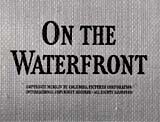


On the Waterfront (1954), 108 minutes, D: Elia Kazan
Best Director-winning Elia Kazan's compelling, evocative, gritty, Best Picture-winning drama was about trade union corruption, racketeering and violence on the New York waterfront and the struggles of an ex-prize fighter, with a symbolic Christian martyr theme. Inarticulate, Irish ex-boxer champ Terry Malloy (Oscar-winning Marlon Brando), a longshoreman-worker on the docks, was introduced as a caretaker for pigeons on the roof of his tenement apartment. He helped to set up the murder of a fellow dock worker named Joey Doyle - a victim of gangster union boss Johnny Friendly's (Oscar-nominated Lee J. Cobb) oppressive hold over the longshoremen. Joey was being punished for threatening to 'sing' to the New York State Crime Commission. Another dockworker Timothy "Kayo" Dugan (Pat Henning) who testified was also deliberately killed on the job. When Terry began to fall in love with shy and frail Edie Doyle (Oscar-winning Eva Marie Saint), the dead man's grieving and distraught sister, his allegiances were challenged. She wanted him to help find out the truth about Joey's suspicious death, and she also challenged the local parish priest Father Barry (Oscar-nominated Karl Malden) to stand up to the corruption of mob rule. Father Barry delivered a symbolic and memorable "Sermon on the Docks" in the hold, a speech to commemorate Dugan's death, about the sin of keeping silent. As Terry gradually fell in love with Edie, he became more and more conflicted about testifying against the mob, and about disobeying his crooked, scheming lawyer and older brother Charley Malloy (Rod Steiger), who worked for Friendly as an accountant. Terry made two confessions about his complicit involvement: (1) To Father Barry: "I just thought they was gonna lean on him a little bit. I never figured they was gonna knock 'em off....You know, if I spill, my life ain't worth a nickel"; and (2) To Edie - a prolonged blast from a ship's whistle drowned out and accentuated his words. She reacted with horror, turned and ran away from him and never turned back. The film's most famous scene was Terry's "I coulda been a contender" speech in the back seat of a taxi-cab with Charley who worried that Terry would testify against the mob. It was mostly a conversation about Terry's failed career as a boxer. Terry chided his brother about not looking out for him properly and allowing him to become a failure and a bum, by urging him to take a fall in his last fixed fight ("...Whadda I get? A one-way ticket to Palookaville....You was my brother, Charley. You shoulda looked out for me a little bit. You shoulda taken care of me - just a little bit - so I wouldn't have to take them dives for the short-end money....You don't understand! I coulda had class. I coulda been a contender. I coulda been somebody, instead of a bum, which is what I am. Let's face it (pause) ... It was you, Charley"). Terry shockingly discovered Charley's corpse hanging on a longshoreman's hook in a back alley, illuminated by a truck's headlights. He was presumably murdered as a reprisal because it was thought he couldn't convince Terry not to testify. After the murder, Terry defiantly testified against Friendly to break wide open the case of Joey Doyle. He found himself threatened with unemployment, and the murder of his pigeons on the rooftop. In the finale, Terry defiantly challenged the work boss and other workers, but found himself shunned by the other longshoreman as a "rat" and informer. Terry marched down to the union office-shack (followed by workers-onlookers) to personally confront Johnny Friendly and accuse him of murder. Terry was beaten unmercifully behind the waterfront shack at the pier and nearly killed in a fight to the death. However, he was able to rally the longshoremen to his cause against the exploitative dock bosses by refusing to lose his union job. He broke the strangle-hold power of the union boss when the dockworkers defiantly claimed: "He don't work, we don't work." The workers, forming a line on the side, rallied around their new leader as he led the loitering longshoremen back to work through the gate past the shipping boss, although he was dizzy and unsteady on his feet. He had convinced the others to refuse to work unless he was allowed entry into the warehouse. The desperate Friendly was unable to persuade the workers from following Terry as he screamed out: "Where you guys going? Wait a minute? I'll remember this! I'll remember every one of ya! I'll be back, don't you forget that. I'll be back."




Rear Window (1954), 113 minutes, D: Alfred Hitchcock
Hitchcock's masterpiece of obsessive human curiosity and voyeurism was based upon Cornell Woolrich's short story first published in 1942, and titled as "It Had to Be Murder." It was a suspenseful, nail-biting mystery-thriller about a wheelchair-bound, immobilized NY magazine photographer who believed he had witnessed a murder during his convalescence in a wheelchair. During a New York summer heat wave, bachelor, free-lance photo-journalist L. B. 'Jeff' Jeffries (James Stewart) recuperated in his Greenwich Village, NY apartment from a broken leg. He wiled away the time by "peeping" and observing - and spying on neighbors through his rear window (with both binoculars and his long telephoto-lens camera), while being cared for by his fashionable, socialite girlfriend-model Lisa Carol Fremont (Grace Kelly) and nurse-therapist Stella McCaffery (Thelma Ritter). He experienced all of life's extremes through his neighbors seen through their framed windows - a honeymooning newly-wed couple (Rand Harper and Havis Davenport), shapely blonde exerciser-dancer Miss Torso (Georgine Darcy), lonely and suicidal spinster Miss Lonelyhearts (Judith Evelyn), a struggling pianist-songwriter (Ross Bagdasarian), and an intriguing, bickering couple - a traveling costume jewelry salesman Lars Thorwald (Raymond Burr), and his little-seen invalid wife Mrs. Thorwald (Irene Winston). Stella cautioned Jeff about his lack of roots and commitment, his sidestepping of marriage and his lukewarm attitude toward Lisa, his fashion-model girlfriend. After a late-night suspicious female scream and breaking glass, and views of Thorwald making repeated late-night trips carrying a suitcase, Jeff persisted with attentive observations and suspicions about Thorwald killing his wife, although he was dissuaded by his NYC police detective friend Lt. Tom Doyle (Wendell Corey) and Stella to not exaggerate. Over time, Lisa became convinced and concluded that Jeff's insane, sinister, and imaginative conclusions might be accurate. Jeff reported that the salesman wrapped a saw and a butcher knife in newspaper, and put a rope around a large trunk. Lisa speculated that Thorwald was involved in an adulterous relationship with a female accomplice in the murder of his wife; she became convinced of the truth of Thorwald's guilt. There were further concerns when an upstairs older couple's (Sara Berner and Frank Cady) dog (that was seen digging in the garden) was found dead from strangulation in the courtyard, and Jeff noticed that the only person who didn't emerge from inside when the dog was discovered was Thorwald, seen smoking a glowing cigarette in his darkened apartment. To confront the possible killer, Jeff had Lisa deliver an anonymous note asking, "What have you done with her?" Jeff also daringly had Lisa and Stella dig in the garden for evidence (while Thorwald was lured away), but when they didn't find anything, Lisa decided to enter Thorwald's apartment to look for the wife's wedding ring. In the film's most suspenseful scene, Lisa tensely explored and searched in suspected wife-murderer Thorwald's apartment for incriminating evidence just before he returned - she was ecstatic when she found an alligator hand-bag, proof of Thorwald's guilt - he must have murdered her because, according to Lisa, no woman goes on a trip leaving behind her favorite jewelry (or handbag). Jeff nervously reacted as he watched powerlessly and helplessly from across the courtyard when Lisa was trapped and confronted face-to-face in the apartment by Thorwald. Caught, she was assaulted but rescued when the police arrived in the apartment's corridor just in time to prevent any serious injury. During questioning, to signal that she had found the ring, Lisa pointed to Thorwald's wife's wedding ring on her own finger that she waved behind her back. Lars noticed her signals and the wedding ring, and followed the sight-line sent by Lisa (behind her back) to Jeff in his apartment. He triangulated the view - and spotted the mortal threat. He looked up and discovered that Jeff, his tormentor, was watching from the apartment window across the courtyard, looking directly into his telephoto lens. It was the first time he had noticed the voyeuristic spy in the apartment complex - it was a chilling moment in the film as he saw the threatening spectator and knew where he lived. Thorwald was alerted to the fact that he was being watched, and the tables were now turned. When a phone call came in to Jeff's apartment from Thorwald, Jeff accidentally identified himself as the voyeur. Soon after, Thorwald broke into Jeff's dark place across the courtyard. Defensively, Jeff set off bright flashbulb bursts to temporarily blind Thorwald, but eventually was overpowered and thrown out the window to the ground, after which Thorwald was apprehended by police. Jeff was shortly later seen now with a cast on both of his broken legs, and congratulated that his suspicions were well-founded - Thorwald had confessed that he had distributed his wife's body parts in the East River. Earlier because the dog had become "too inquisitive," Thorwald was forced to dig up Mrs. Thorwald's head from the flower garden bed and move it to a hat box in his apartment.


Sabrina (1954), 112 minutes, D: Billy Wilder
Director Billy Wilder's delightful romantic comedy, with a light-hearted story, was a version of the Cinderella tale. Chauffeur's daughter Sabrina Fairchild (Audrey Hepburn) worked and lived at the large Larrabee estate on Long Island, NY with her widowed father, the family chauffeur Thomas Fairchild (John Williams). The youngest ultra-rich Larrabee son was light blonde, ne'er-do-well, womanizing, unattached playboyish David Larrabee (William Holden) who was three times divorced; his older brother was stuffy, formal, workaholic, middle-aged, conservative and uptight businessman Linus Larrabee (54 year-old Humphrey Bogart) who was running Larrabee Industries Ltd. and associated companies. Sabrina became depressed and in despair about her unrequited love for David, and tried to asphyxiate herself in the closed garage via carbon monoxide poisioning. She was dramatically rescued by Linus and carried back to her bedroom above the garage. During the next section of the film, Sabrina was urged by her father to find a cure for her hopeless romantic urgings and ambitions. She departed for Paris for chef and culinary training at Le Cordon Bleu. Sabrina failed miserably at cooking in the school, but was trained in becoming more sophisticated and poised. Back in the Larrabee household, Linus manipulatively encouraged David, for solely business reasons, to enter into an engagement and marriage of convenience (and $20 million business deal) to wealthy socialite-heiress Elizabeth Tyson (Martha Hyer). David agreed to the "merger," but was immediately overwhelmed by Sabrina who unexpectedly returned after two years. She had been transformed into a costumed Cinderella - a refined, sophisticated and cultured 22 year-old woman with a new hairdo and sleek clothes. Sabrina's father cautioned her about falling in love with David again, since he was engaged (and was planning to be married in 10 days). Linus schemed to waylay David's interest in Sabrina that would endanger the arranged marriage, but then found himself falling under Sabrina's romantic spell. The stodgy Linus continued his maneuverings to wean Sabrina away - to romance her and distract her from David. Gradually, however, Linus began to fall in love with Sabrina, although she was unaware that he had dishonest intentions regarding her future. Linus was thinking of sailing her back to Paris on a French cruise liner within a week to get her out of the way (although she assumed that he would be traveling alone to Paris to rejuvenate his own unfulfilled romantic life). Actually, Linus' devious plan was to send Sabrina back to Paris alone, even though he had reserved two spots on the cruise liner for them. He would pay for Sabrina's living expenses in Paris and support her with a car, apartment, bank credit ($50,000), and 1,500 shares of preferred Larrabee stock would be granted to her father. When Sabrina saw two tickets to Paris on Linus' desk, she believed that he had booked passage for both of them. In a dramatic revelation, Linus dashed her hopes and dreams, by admitting his plan was to send her back to Paris alone - as part of his scheme to keep her away from David. She departed with her ticket to sail away alone (the next day), and sadly said farewell. The next morning during a Larrabee board meeting, Linus shockingly announced that he had called off his brother's wedding - he had arranged for David to take his place to Paris with Sabrina. However, David appeared and showed off an afternoon newspaper announcement of Linus' elopement with Sabrina to Paris. In the film's major plot twist, David explained that the expected romance between himself and Sabrina had been transferred to Linus. After orchestrating an entirely different scenario and role reversal (that placed the importance of love over business), David encouraged Linus to end up with Sabrina in Paris. David's own marriage and merger would proceed as scheduled, while David had arranged for Linus to sail to Paris with Sabrina - a tugboat was prepared to take him to the ocean liner. Linus rushed off from the meeting to rendezvous with Sabrina - on the boat to Paris.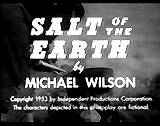
Salt of the Earth (1954), 94 minutes, D: Herbert J. Biberman
Director Herbert J. Biberman's and writer Michael Wilson's independently-made, political and social commentary historical drama was about American working people. It was the only theatrical-length film ever openly made in the US by a group of blacklisted film-makers. The film was based upon a real-life zinc miners strike in Grant County, NM of Mexican workers in 1951 against the Empire Zinc Company. The film's narrator and heroine, Esperanza Quintero (Rosaura Revueltas), lived with her oppressed miner husband Ramon Quintero (Juan Chacón) who had worked in the mines for 18 years. They were a typical impoverished Mexican-American family with two young children, living in a run-down shack (without utilities) owned by the mining company (Delaware Zinc) in San Marcos, renamed to Zinc Town. After her husband Ramon experienced a nearly-tragic dynamite explosion in the mine with unsafe working conditions and racial prejudice, he complained to the company's white representative Chief Foreman Barton (David Wolfe) who was unsympathetic, and a second accident brought the same result. The miners' union threatened to stop their work and initiate a strike. A months-long struggle of the striking miners (and their picketing wives in support) began, to overturn the oppressive system and its owners, provide safer working conditions, equal pay for equal work, better sanitation (hot running water, plumbing) and health care. For his resistance, Ramon was handcuffed, arrested by two bigoted policemen, beaten in the back of a squad car, and jailed for a month - charged with assault and resisting arrest, and meanwhile Esperanza gave birth to their third child. The strike was extended for many months when the company refused to negotiate, forcing some mining families to leave the area. The situation became desperate for those who remained. There was some help and aid in the form of letters and contributions that poured in from everywhere to support them. A crisis arose when the Sheriff brought a Taft-Hartley Act injunction (supportive of the mine owners) against the unionized male miners to end their strike. To counter-act and bypass the injunction, the wives decided to band together and picket for the men. A motion (with the women voting) was carried to allow the women to picket for the men. Forming a picket line, the women stood fast when the Sheriff and his deputies attempted to disperse them, and successfully fought back. In retaliation against the resistance, the Sheriff (with pressure from mine representatives and the company) was given orders to arrest the determined Esperanza (and other leading female ring-leaders). Esperanza refused to be separated from her baby and children and was hauled off in the back of a pick-up to the local jail. After Esperanza's release from jail four days later, she told Ramon that they wouldn't be arrested again, since they had caused such a ruckus. During a domestic argument with her husband, Esperanza stated: "You can't win this strike without me! You can't win anything without me!" One final back-breaking tactic was to issue eviction orders to remove all of the striking families from their company-owned homes, beginning with the Quintero family. Everyone gathered around the house to defy and resist the eviction order peacefully - with solidarity and dignity, and soon vastly outnumbered the police. They were able to successfully protest the unjust eviction by their adversaries and save the home from eviction. In the conclusion, the Delaware Zinc Company admitted defeat and began negotiations with the union of mine workers to settle the strike.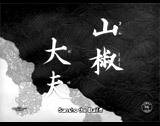
Sansho the Bailiff (1954, Jp.) (aka Sanshô Dayû), 124 minutes, D: Kenji Mizoguchi
Kenji Mizoguchi's very moving and sad drama (about a family torn apart) was set in medieval 11th century Japan during a time of warring social classes and rampant slavery and brutality. A family in 11th century feudal Japan was comprised of the idealistic father Masauji Taira (Masao Shimizu), his wife Tamaki (Kinuyo Tanaka), their daughter Anju (Kyôko Kagawa) and his young son Zushiô (Yoshiaki Hanayagi). The virtuous, humanitarian and compassionate feudal governor and father Masauji treated his peasant subjects fairly (and refused to overtax them). Before his ouster and exile, Masauji offered wise advice to his young son Zushio - along with a small golden statue-amulet representing the Goddess of Mercy, Kwannon: "Zushio, I wonder if you'll become a stubborn man like me. You may be too young to understand, but hear me out anyway. Without mercy, man is like a beast...Even if you are hard on yourself, be merciful to others. Men are created equal. Everyone is entitled to their happiness." The feudal governor was ousted, banished and exiled to a remote province for not enforcing the harsh tax laws (on rice) and the military draft. His aristocratic family embarked on a lengthy search for him. In a devastating sequence, the members of the family were separated during a lakeside seizure - tricked by a priestess and sold to the estate of Sanshô (Eitarô Shindô), a ruthless, cruel and corrupt bailiff, tax-collector and manager of a lordship's manor, who maintained a large slave contingent; the two children became indentured servants when sold into slavery, and the mother Tamaki was sold into prostitution on Sado Island. While enslaved in the camp's compound, Anju retained her humanity, while Zushio lost his compassion by mercilessly punishing and executing other slaves and becoming one of Sansho's enforcers. Zushio neglected his father's advice as he became a barbaric henchman for Sansho and carried out murder and torture (branding the foreheads of attempted escapees with a hot sword) of other slaves. In a tragic scene, the two children were ordered to take a sick slave girl into the woods to die, and they decided to make an escape attempt. Anju persuaded Zushio to flee with the sick female, while she self-sacrificially drowned herself (off-screen) in a lake (to avoid capture and torture - "Isn't life torture?"). She created a diversion to save her brother by not revealing his location. Zushio successfully escaped and hid out in a monastery before appealing for mercy to the Emperor's Chief Advisor in Kyoto. After being recognized as the son of a once-respected governor, Zushio was reinstated to the position. Now elevated and converted, he was determined to criminalize slavery and fight against injustice. During a nihilistic sequence, the former slaves revolted and burned down Sanshô's manor, and exiled the nefarious bailiff. Later, Zushio resigned his governorship and was determined to locate his mother. In the film's catharctic ending, after twenty years, Zushio and his hobbled, half-mad mother (now aged, lame and blind, and with a shattered life) were tearfully reunited on the tsunami-devastated beach of the island of Sado. He heard his mother's singing - at first she didn't believe he was her son, but did identify him by using her fingers to trace the shape of his face. Then she was saddened to hear when he revealed that both Anju and her husband were dead: "It's just you and I. We're all alone now." Zushio claimed that he had finally adopted his father's teachings.



Senso (1954, It.) (aka The Wanton Countess), 118 or 93 minutes, D: Luchino Visconti
Director Luchino Visconti's 3-Strip Technicolored historical period fantasy and melodrama was about an illicit, destructive and ill-fated romance, with lush sets and costuming. Its historical context was the 1860s - a time of Italian independence and unification. The film's setting was during the brief war between Italy (and Prussia) against the Austrian Empire in the summer of 1866. The film opened in the Austrian-occupied city of Venice, in a scene set in La Fenice Opera House half-way through a performance of Giuseppe Verdi's four-act opera Il Trovatore ('The Troubadour'). A political demonstration (considered sedition by the Austrians) broke out during the intermission due to Italian Nationalists stirring up protest in the audience. Leaflets were distributed to express dissatisfaction with the presence of white-uniformed officers of the occupying-Austrian troops, who were sitting in the best seats in the house. An unhappily-married, well-educated and proud Italian aristocrat, Countess Livia Serpieri (Alida Valli), who was married to older businessman Count Serpieri (Heinz Moog), observed from her opera box. A shouting match of offending insults had broken out on the floor of the opera house between her radical, freedom-fighting cousin Marchese Roberto Ussoni (Massimo Girotti), the leader of the Resistance who had organized the protest, and handsome, young, vain and dashing adventurer - Austrian Lieutenant Franz Mahler (Farley Granger). Fearing for her cousin's life, the conniving Countess sought out the Lieutenant to prevent a scheduled duel-challenge from taking place. During a late-night curfew in the city, she again encountered the womanizing, seductive Lieutenant and spent the entire evening with him strolling through the city's back alleys and canals. She was immediately smitten by him and struck up an ultimately-treacherous, indiscreet friendship and romance with him. The Countess recklessly betrayed her husband by remaining with the Lieutenant in a sordid and secretive relationship that soon became public knowledge. They often met in a room for sex that she had rented in the Old Quarter of Venice. By giving herself over to their promiscuous affair and living only for the present moment, she began to realize that she had lost control of her feelings. At the same time, she was blinded to the Lieutenant's real flawed and opportunistic, womanizing nature. The uncommitted, unworthy, manipulative cad and cheap phony was exploiting her while also entertaining other lady friends. Desperate to see him after he suddenly disappeared for a few days, she became paranoid, agonized and unreasonably jealous. Due to the war, the Countess was forced to flee from the city for safety to her husband's palazzo in the countryside. The Lieutenant risked following the Contessa there and snuck into her bedroom from the balcony, and expressed his sincere love for her before making love (off-screen). However, she began to wonder whether she had betrayed her country's revolutionary cause of independence and her highest ideals during their forbidden affair. The unprincipled Franz - using false pretenses - betrayed the Contessa, by asking for much of her money (funds that she had saved to support the "cause" of the Italian partisan rebels including her cousin Roberto, to fight the Austrians). The cowardly Lieutenant claimed that he could bribe a military doctor to certify him as unfit for duty so that he wouldn't have to go into battle. She was convinced to give up most of her fortune of over 3,000 florins earlier promised to her cousin Roberto. As a result of her betrayal of the rebels, the partisans were massacred and forced to retreat. As battles were being fought in the region during the war, the Contessa became anxious when she was unable to see the Lieutenant or receive further communications. Eventually, a letter arrived from Verona, thanking her for her financial support that effectively provided an exemption for him from the home-front. Ignoring the Lieutenant's specific directions to stay where she was, the Countess risked a dangerous coach ride to Verona through the war zone to see him. She surprised the gold-digger and "drunken deserter" Franz in a rented apartment that she had financed for him, where she found him in the company of young tart-prostitute Clara (Marcella Mariani), as he noted: "I pay her with your money." He crassly and insultingly called the Countess his "wealthy patroness" who wasn't much better than the hired streetwalker. He claimed that she thought like he did - that love could be purchased. He had enough of her love for him and yelled: "I'm not your romantic hero! And I don't love you anymore," before he ordered her to get out. The humiliated, abandoned, cuckolded and vengeful Contessa decided to find moral redress by betraying Franz (evidenced by his written letter) to a General in the Austrian Army. Afterwards, she was left all alone to cry out Franz' name as she staggered away. Franz was seized from the residence and immediately sentenced to be executed by a firing squad for treasonous and dishonest desertion from the battlefield.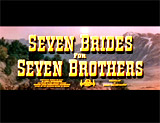

Seven Brides for Seven Brothers (1954), 103 minutes, D: Stanley Donen
This successful MGM, Stanley Donen-directed film, in CinemaScope, was one of the best musicals of the mid-50s. It received a Best Picture nomination and had an Oscar-winning Musical Score (by Saul Chaplin and Adolph Deutsch). Other nominations included Best Color Cinematography, Best Film Editing, and Best Adapted Screenplay. It featured great Gene de Paul/Johnny Mercer songs in the score, plus incredible dancing segments (although shot entirely on a sound stage). The musical was derived from a Stephen Vincent Benet short story titled The Sobbin' Women. Set in the 1850s in the Oregon Territory, it told about the six brothers of Adam Pontipee (Howard Keel) - an Oregon farmer (the eldest of seven brothers), who abducted maidens from town for purposes of marriage. In the early scenes, Adam journeyed to town to buy winter supplies (corn, farm equipment, etc.), and spotted the beautiful, hard-working Milly (Jane Powell), who was chopping wood and serving home-made stew to customers at a local boarding house. He decided that they would get married since she would make a great cook and house-keeper. On the way back to the remote Pontipee farm, she sang about her married future with him - not knowing that she would be caring for six younger, rough lumberjacking brothers as well. After meeting Adam's six unmarried, unruly and rambunctuous brothers and their unkempt house, Milly realized that Adam had married her for her maid skills. Milly took it upon herself to civilize the brothers, and taught them about the etiquette of courting women. About a month later came the film's highlight - a lively and large-scale dance number - an 8-minute barn-raising dance sequence in the local town. It began with a competitive challenge dance of acrobatic leaps and balletic steps (between the local suitors in town and the Pontipees). The barn-raising was followed by a rowdy fist-fighting brawl between the brothers and other jealous suitors in town who were all vying for the attention of the young women. After the brawling fight in town and the approach of winter, during chore-time, the lovesick brothers lamented their situation and pined for female companionship, while chopping wood (with rhythmic axe blows and saw strokes). Adam came up with a dubious plan for the brothers, based on the ancient Roman legend of the Rape of the Sabine Women. The brothers went to town to kidnap the women, then brought them home, and as they were pursued, a snowslide on a mountain pass blocked the road behind them. They were saved, but the six females were also trapped for the winter. When Milly discovered what had happened, she banished the brothers to sleep in the barn for the winter and prohibited any more courting. Adam was also a target of Milly's furious wrath and he was forced to leave for the mountains and exiled for the winter in his hunting cabin. With the arrival of spring, the women were now wishing to pursue romance and get married after a long winter - and the six couples were reunited. Meanwhile, Milly gave birth to a baby girl in the spring. Adam returned and made up with Milly, and helped to care for their newborn child Hannah. He was also ready to announce that the women would be returned to their families, but the plan was opposed by the brothers - and the women who wanted to stay - they ran off. At the same time, the fathers of the abducted women and their angry suitors arrived, caused a fracas, and threatened to hang the brothers. However, the sounds of Hannah's crying prompted all of the females to claim that the baby was theirs ("Mine!"). The Reverend Elcott (Ian Wolfe), Alice's father, conducted a six-way shot-gun wedding ceremony. The film concluded with a sweethearts' song sung by the brothers and their new brides, in various springtime settings for each of the courting couples.


Seven Samurai (1954, Jp.) (aka Shichinin No Samurai), 207 minutes, D: Akira Kurosawa
Director Akira Kurosawa's epic dramatic masterpiece set in the year 1586 was later used as a template for the western The Magnificent Seven (1960). It was about a Japanese peasant village protected from roving hordes of bandits by seven unemployed, recruited samurai or ronin (swordsmen), who were compensated with three meals of rice a day and lodging. The 16th century epic plot was set during the Sengoku Period, a lawless time of civil wars when farmers were at the mercy of ferocious brigands of bandits. The villagers met together to ask: Should they surrender their harvest to the bandits, or fight back against them? The village's elder-patriarch Gisaku (Kokuten Kôdô) who lived in an old mill advised briskly: "Find hungry samurai." Wise veteran leader ronin (samurai warrior) Kambei Shimada (Takashi Shimura), after saving a hostage child from a thief, attracted a wealthy, idealistic, and immature young nobleman named Katsushiro Okamoto (Isao Kimura), who eagerly begged to be Kambei's disciple-acolyte. The farmers asked Kambei (and Katsushiro) to help defend their village, who agreed and then went about recruiting four more masterless samurai warriors (seven in total, including himself). The last to be recruited was a burly, wild, eccentric, annoying, amusing and arrogant Kikuchiyo (Toshiro Mifune). Back in the mountainous village, the farmers were trained to fight in small squad groups with spears for an anticipated siege. Master Kambei surveyed the village with a hand-drawn map and prepared for the strategic defense of its perimeter by flooding some of the fields, creating a moat, evacuating three outlying houses that would be impossible to protect, and establishing high bamboo fence-barriers. One surprising revelation was that Kikuchiyo wasn't really a samurai after all, but the son of a village peasant who clearly identified with the plight of the villagers. A secret and private romantic relationship developed between Katsushiro and the pretty young daughter Shino (Keiko Tsushima) of paranoid villager Manzo (Kamatari Fujiwara), who had ordered her to disguise herself as a male by cutting her hair. After subduing and killing three bandit scouts, the samurai decided to conduct a pre-emptive strike on the bandits' large encampment a half-day ride away, by burning it down. One samurai - a woodchopper named Heihachi (Minoru Chiaki) unfortunately lost his life (a musket shot in the back) during the conflict. The climax of the film was a lengthy 3-day battle against about 40 armed bandits who returned to assault the village; they first attacked and burned the outlying huts and old mill barn across the stream, where they murdered the stubborn Old Man elder and a young couple (with a child). During hand-to-hand combat and the use of spears by the farmers, several of the bandits were killed attempting to scale the barricades or cross the moats. The smart strategy of the samurai was to allow only a few bandits (in the cavalry) at a time to enter into the village on horseback through a small gap or entryway - before surrounding and ambushing them one-by-one. An unnecessary breach in the fortifications led to the death of more villagers, and expert archer Gorobei Katayama (Yoshio Inaba) was also slain (off-screen) at his post (it was the second of four samurai casualties). Kambei knew that the third and last day of fighting would be a showdown and "a fight to the finish." Realizing that they might die, Shino encouraged Katsushiro to have sex with her, but then they were embarrassed after being caught by her father Manzo, who considered her now to be "damaged goods." The rain-soaked last day of fighting was in the mud during torrential downpours against the remaining 13 bandits. Samurai swordsman Kyuzo (Seiji Miyaguchi) with his sword drawn outside was shot in the back by the dishonorable Bandit Chief (Shinpei Takagi) hiding in the woman's hut. The fourth and final samurai casualty was Kikuchiyo who was charging into the hut to avenge Kyuzo's death when he was shot in the abdomen. He briefly revived and retaliated against the bandit chief by skewering him with his sword before dying of his own lethal wounds. The remaining bandits were defeated. The final scene was of the farmers finally at peace again - planting their next crop of rice. Due to class differences, Katsushirō and Shino could never fulfill their romance. With Katsushiro, Kambei and Shichirōji (Daisuke Katô) viewed the graves or funeral mounds of their four dead comrades (each with a samurai sword sticking out), above the graves of the fallen villagers. Kambei spoke the final lines of dialogue to Shichirōji about how the victory belonged to the farmers, but not to the samurai: "In the end, we lost this battle too...I mean, the victory belongs to those peasants. Not to us."
Silver Lode (1954), 81 minutes, D: Allan Dwan
Director Allan Dwan's and RKO's taut and suspenseful, Technicolored psychological low-budget western was a 'guilt-by-suspicion' allegorical film masking as a succinct and timely criticism of the Cold War's McCarthy era (and very close in theme and plot to High Noon (1952)). During a July 4th celebration in the frontier town of Silver Lode in Nevada, four men on horseback arrived from the town of Discovery, California. The foursome group of law officials was led by accusatory and vengeful 'Marshal' Fred McCarty (Dan Duryea) (the name was a clear reference to Sen. Joseph McCarthy). The Marshal's three 'deputies' were Johnson (Harry Carey Jr.), Kirk (Alan Hale Jr.) and Wicker (Stuart Whitman). A marriage ceremony in progress in the town's church was abruptly interrupted. The couple being married was respected, wealthy rancher/citizen and town sheriff Dan Ballard (John Payne) (a reformed, ex-gunslinger from two years earlier) and his pretty fiancee Rose Evans (Lizabeth Scott), the daughter of wealthy Zachary Evans (Morris Ankrum). The zealous McCarty claimed they were on a manhunt with an arrest warrant for Ballard for the crimes of murder and theft committed two years earlier - the robbery of $20,000 from McCarty's brother by Ballard who cheated during a poker game, and then murdered the brother (with a bullet in the back). Ballard who knew of McCarty and his brother (both rustlers and outlaws from the past) called him a liar and the charges false. McCarty demanded that Ballard be extradited and accompany them to California where the murder occurred. The wrongly-accused Ballard decided to hold off on his wedding. Ballard confessed to Rose that the brother's murder was in self-defense: "I did kill his brother" - but not in the back. In front of the town's Judge Cranston (Robert Warwick), McCarty's extradition request was upheld; however, the judge allowed Ballard two hours to delay (or stall) the proceedings to track down evidence to clear his name and prove his innocence. The telegrapher Paul Herbert (Frank Sully) was pressured by Ballard to send the same message to two Sheriffs in Discovery, and a third to the US Marshal in San Francisco, to receive verifications to confirm McCarty's identity and warrant. However, the transmissions failed - the lines appeared to be down (Ballard immediately suspected that the wires had been deliberately cut by McCarty). Ballard was able to bribe or buy off Johnson, one of McCarty's 'deputies', for $5,000 cash to reveal the truth and turn on McCarty and expose him. In the town's livery stable, Johnson admitted that McCarty had cut the telegraph wires and also possessed forged Marshal paper credentials and then killed the forger. Listening from the upper stable loft, McCarty shot Johnson dead, and then blamed Ballard for the murder: "Ballard just shot Johnson!" And then when Sheriff Wooley in the loft overheard McCarty's incriminating conversation with Ballard, he was also shot dead. McCarty blamed both murders (Johnson and the Sheriff) on the guilty-looking Ballard. When pressured to surrender, Ballard was forced to escape and flee on horseback and defend himself, and he killed the other two 'deputies' (Kirk and Wicker) and slightly wounded Rose's brother Michael "Mitch" Evans (John Hudson). Pursued by McCarty and other deputized townsmen during a house-to-house search, the very desperate and wounded Ballard - filmed with a series of masterfully-choreographed tracking shots - was followed as he ran across town from the Evans' home and down Main Street to the church, where he found sanctuary granted by the town's Reverend Field (Hugh Sanders). Meanwhile in the telegraph office, Ballard's bride-to-be Rose and Ballard's ex-mistress and saloon girl Dolly (Dolores Moran) (who had joined forces) pressured Herbert to forge a phony telegram return-response showing that McCarty's credentials had been falsified. Rose raced with the manufactured telegram to Judge Cranston at the church, who read it outloud to all the townsfolk: ("McCarty not what he represents himself to be. Wanted for murder and cattle rustling. Dan Ballard innocent of charge") - the news exonerated Ballard and proclaimed his innocence. Simultaneously, there was a climactic confrontational showdown scene high up in the church bell-tower. The cornered, defenseless, unarmed and wounded Ballard was stalked by the evil, gun-shooting antagonist McCarty. Ballard was saved -- literally, when McCarty's own bullet ricocheted off the giant swinging church bell, and he was struck in the heart by his own deflected bullet. The reprieved and saved Ballard descended from the church bell-tower and angrily scorned the townsfolk who only retroactively apologized. In the film's epilogue, Ballard's name and reputation were cleared and it was confirmed that he was innocent all along and had been telling the truth. The receipt of a real telegram from Sheriff Harper in Discovery, CA completely and truly exonerated him: ("Fred McCarty wanted. Murder and Rustling. US Marshal on way to Silver Lode").


A Star is Born (1954), 176 minutes, D: George Cukor
Director George Cukor's dramatic musical and classic tearjerker was a superior remake of William Wellman's non-musical, classic 1937 film of the same name, starring Janet Gaynor and Fredric March that was inspired by What Price Hollywood? (1932) also directed by Cukor. [Note: It was also updated to modern times twice as a musical drama - first as A Star Is Born (1976) with Barbra Steisand and Kris Kristofferson, and second as A Star Is Born (2018), starring director/actor Bradley Cooper and Lady Gaga.] The film opened during a late-night gala benefit "Night of Stars" held at Hollywood's Shrine Auditorium, where boozing, womanizing, brilliant, but fading alcoholic movie actor Norman Maine (James Mason) lurched onstage during a song and dance act being performed by young, aspiring newcomer-star actress and vocalist Esther Blodgett (Judy Garland). Impressed by her, later that night Norman tracked her down and found her in an empty, after-hours Sunset Strip musicians' hangout where he watched her sing. He drove her home and expressed how impressed he was with her star quality and spark of genius. He promoted her with his studio for a screen test, and her career was quickly launched and on the rise in Hollywood - as a singing sensation with a new name Vicki Lester. Her film debut preview was a sensational success, compared to the lukewarm reception that Norman's film received - Norman's popularity was definitely in reverse and on the decline. Although Vicki was concerned about Norman's drinking, she accepted his impulsive proposal of marriage and they had a very private ceremony. Afterwards, their marriage was tested by the tragic consequences of Norman's personal self-destruction, disintegration and loss of fame. Norman was told that he was being dropped at the studio, because he had become too big a risk, lapsing in his screen performances due to his alcoholism. Norman soon realized how much attention Vicki was receiving and how much the public had already forgotten him, and he took to drinking more heavily. In the annual Academy Awards Banquet Ceremony scene, Norman abruptly interrupted the proceedings. He gestured wildly on stage and accidentally slapped Vicki while she was delivering her acceptance speech for Best Actress. Norman was admitted to a sanitarium for treatment of his alcoholism. After Norman's discharge months later, he spent some of his spare time at the Santa Anita Race Track, and his initial efforts to sober up seemed promising. However, he went on a monumental drinking binge and was arrested and threatened with jail-time. Esther was willing to sacrifice her career to help her husband Norman regain his stability and sobriety, and she brought him back under her custody to their Malibu home. She told Niles that she planned to quit Hollywood so that she could go away for good and take care of him, to restore his health. Norman overheard their conversation and - in the film's shocking, tragic but inevitable sequence, he committed suicide by walking into the ocean from the beach house at dawn. In the film's memorable conclusion, Vicki was persuaded by her studio accompanist Danny McGuire (Tommy Noonan) to come out of mourning to perform and keep Norman's memory alive. She posthumously honored her husband onstage at a Shrine Auditorium benefit concert where she proudly introduced herself as Mrs. Norman Maine ("Hello everybody. This is Mrs. Norman Maine").


La Strada (1954, It.) (aka The Road), 94 minutes, D: Federico Fellini
Director Federico Fellini's romantic, tear-jerking drama and timeless modern-day spiritual fable about domestic/sexual abuse and oppression was the first-ever Academy Awards winner for Best Foreign Language Film (Italy). In war-ravaged Italy after the war, traveling strongman and circus performer Zampano (Anthony Quinn) appeared at the seaside family village of his recently-deceased female companion Rosa. He bargained with Rosa's widowed mother (Anna Primula) to purchase another daughter - naive, wide and saucer-eyed young Gelsomina (director Fellini's wife Giulietta Masina), for 10,000 lire, to replace Rosa as his acting companion and partner. The simple-minded, free-spirited waif and gamin had no choice but to accept the arrangement. On the road, the itinerant, brutish street-performer Zampano performed a chain-breaking act with his chest and "lungs of steel", and taught Gelsomina to preface his street act with music (banging on a drum) and by dressing as a clown. Zampano was revealed to be physically and psychologically abusive - he beat Gelsomina with a tree switch when she didn't obey, and then went off and abandoned her one evening with a red-headed prostitute. Zampano continued to deflect probing questions that Gelsomina asked about his life with Rosa. She decided to rebel against him, and announced her decision to leave him: "I go away - Back to my village." Gelsomina was led into a nearby town by three musicians, and after following a religious procession, she watched another street performer's act on a high-wire tightrope - executed by Il Matto ("The Fool") (Richard Basehart). Zampano tracked her down, and forcibly ordered her back into the truck ("Get in"). Soon after, they joined Giraffa's circus, where it was discovered that Il Matto was also employed. A compulsive, feuding conflict immediately developed between the mindless Zampano and the taunting and witty Il Matto (who couldn't help but recklessly tease, antagonize and insult Zampano), causing Zambano to become enraged. After a wild altercation between them, Zampano angrily drew a knife and chased after Il Matto; Zampano was handcuffed and briefly jailed by police, and both men were permanently fired from the circus. Both the circus owner and Il Matto offered Gelsomina a chance to accompany them, but she felt compelled to remain with Zampano. In one memorable scene, Il Matto convinced Gelsomina of her own life's worth, and she brightened up, but then interpreted his advice as a justification for selflessly remaining dedicated to Zampano. During an overnight stay in a barn next to a nun's monastery, Gelsomina asked Zampano to marry her, but he rejected her request and remained silent. After leaving the monastery, Zampano's truck came upon Il Matto fixing his broken-down car's flat tire on a rural road. During a brutal brawl between the two, Il Matto suffered severe head injuries, complained about his broken watch (a symbol of his life's end) and then collapsed dead next to the road. To cover up the crime, Zampano dragged Il Matto's body (in a crucifix pose) and dumped it in a creek and then pushed his car off a bridge (with a fiery crash). They were now on the run from the law and a predictable prison term for Zampano. Traumatized by Il Matto's (The Fool's) demise, for the next ten days, the lifeless, mute, soul-injured Gelsomina couldn't perform in the sideshows, and Zampano decided to abandon her for good. Four to five years later, Zampano was working for the traveling Medini Circus. While walking in town, he heard the same unforgettable song that Gelsomina often played on the trumpet - it was being sung by a woman hanging up sheets. He was told that the woman's father had taken in the feverish, sickened, mute and a "little bit crazy" vagabond (Gelsomina) after she had left the circus and was found near the beach. The woman had often heard her play a trumpet, but then Gelsomina became severely ill and didn't wake up one morning. In the tragic film's conclusion, the stony-hearted Zampano became drunk, brawled in a bar, and then stumbled alone to the seashore in the darkness while yelling: "I want to be alone. Alone!" There, he waded into the edge of the water, fell onto the sand, looked up to the heavens, broke down into tears (showing true emotion), and vainly grasped at the sand that slipped through his fingers.

Them! (1954), 94 minutes, D: Gordon Douglas
Director Gordon Douglas' paranoic mid-50s, sci-fi horror film creature feature reflected the time period of the Cold War mid-1950s, when a new era of testing dangerous atomic weapons in the mid-1940s was feared to have caused mutations. It was one of the most classic mutant monster B-flicks - "THEM!" was noted as the first "Big Bug" Monster feature with great special effects and a convincing story - setting off a science-fiction trend. The main terror facing mankind was ants that had mutated into giant creatures - they were considered the only other species that engaged in war. The sci-fi film opened in the New Mexico desert, where two state troopers Sgt. Ben Peterson (James Whitmore) and his partner Ed Blackburn (Chris Drake) found a traumatized, mute five or six year-old girl (Sandy Descher) (later identified with the last name of Ellinson) wandering in shock and trance-like, carrying her doll. The child was found near her trailer camp (where she was staying with her parents and brother); they were missing and there was evidence that they had been attacked and the trailer was destroyed. While the girl was lying in an ambulance and about to be taken to a hospital, a peculiar, vibrating sound prompted her to sit up. Twelve miles away was "Gramps" Johnson's General Store that had also been ransacked and destroyed, and the store owner (Mathew McCue) was found dead. A large wooden barrel of sugar was knocked down and open, and the sweet powder was being consumed by small ants. Left alone at the murder scene, Officer Blackburn was attacked and killed as he went to investigate another high-pitched sound off-screen. FBI agent Robert Graham (James Arness) from Alamagordo, NM was called in, and two scientists (ant entomologists) from the Department of Agriculture in Washington DC arrived: Dr. Harold Medford (Edmund Gwenn) and his pretty daughter Dr. Pat Medford (Joan Weldon). At the hospital, the young girl was revived out of her shocked state by a sniff of formic acid provided by Dr. Medford, and she screamed: "THEM! THEM!!!! THEMM!!!!" While exploring during a raging sandstorm at the site of the destroyed trailer, Pat screamed when one giant ant attacked her from behind and was able to attract the attention of the others. It was pulverized with submachine gun fire. Dr. Medford identified the creature as a mutation - part of a race of giant radioactive and carnivorous ants with large mandibles that had decended from a radiated ant. Its odor of formic acid was what triggered the girl to violently react, and Gramps' corpse was filled with the substance after being injected through the ant's stinger: "Ants use their mandibles to rend, tear and hold their victims but they kill with that, by injecting formic acid." The Medfords both suggested locating the colony of the foraging "scout" ant. The cone-shaped mound of the ant's nest was located from the air - it was a deep hole in the desert ground. At noon the next day, the nest's opening was bombed and burned with bazookas and the tunnels were then gassed with cyanide. To determine the results, Pat, Graham, and Sgt. Peterson rappelled into the nest and its deep tunnels to explore. The Queen Ant's chamber with two empty, hatched eggs was ordered to be incinerated. Dr. Medford was worried that two young Queen Ants had hatched and escaped, and would now mate and produce further nests elsewhere. Further unusual sightings or disturbances included a report from Brownsville, Texas by ranch foreman Alan Crotty (Fess Parker) who crashed his plane after sighting three ant-shaped flying saucers. Traveling from Acapulco, Mexico to Singapore, the S.S. Viking was infested with giant killer ants and had to be sunk with naval gunfire. Two troubling incidents were also reported in Los Angeles - probably the result of the hatched Queen Ants: (1) 40 tons of sugar had been stolen from a railroad car, and (2) a father named Thomas Lodge was killed and his two sons Jerry and Mike mysteriously disappeared while they were flying a model airplane in LA's concrete river basin near the opening to 700 miles of storm drain sewer tunnels below the city. Martial law and a curfew were issued for the city of Los Angeles, and an informative descriptive news bulletin was broadcast over TV about the emergency. During a rescue attempt with the cooperation of the Army (Jeeps were driven into various sections of the LA tunnel system), Sgt. Peterson rescued the two threatened boys by aiming his flamethrower at the giant ants, but then was killed by one of them when grabbed around the waist with its giant mandibles. Dr. Medford ordered the destruction of the nest's chamber (with unhatched Queen eggs) in Drain # 267 with bazookas and flame throwers. The film concluded with more ominous words (the film's final line of dialogue) from Dr. Medford: "When Man entered the Atomic Age, he opened a door into a new world. What we'll eventually find in that new world, nobody can predict."

Three Coins in the Fountain (1954), 102 minutes, D: Jean Negulesco
Director Jean Negulesco's Fox's light, glossy, vapid and Technicolored CinemaScopic sentimental, escapist romantic travelogue was a big-budget film about the blossoming of love affairs for three romance-minded American secretaries in Rome. While wearing designer clothes and experiencing an unusually uncrowded Rome ("The Eternal City"), they became romantically involved with three Italian men while working there. It received three Academy Awards nominations (including Best Picture) and won two Oscars: Best Color Cinematography (for Milton Krasner) and Best Song (the title song "Three Coins in the Fountain" sung by Frank Sinatra in the film's opening). In the early 1950s, young American Maria Williams (Maggie McNamara) arrived for a new job as a secretary at the U.S. Distribution Agency (USDA) for boss Mr. Burgoyne (Howard St. John). Maria was picked up by the secretary she was replacing - Anita Hutchins (Jean Peters), who was returning to the US to allegedly marry her fiancee. She was taken to Villa Eden, where she met Miss Frances (Dorothy McGuire) who had been employed for 15 years as the secretary for great American author John Frederick Shadwell (Clifton Webb), a stuffy, anti-social and elderly ex-pat who owned the villa. At the famous Trevi Fountain, the three followed the custom of throwing a coin into the pool over one's shoulder while making a wish ("a penny's worth of hope") - yet the wish would only come true if one wished to return to Rome. Anita declined to make a wish since she was leaving Rome to be married in the US. At her place of work, Anita introduced Maria to the agency's handsome translator Giorgio Bianchi (Rossano Brazzi), one of her co-workers for two years. It was office policy that American and Italian employees weren't allowed to fraternize: ("Secretaries are not allowed to go out with local employees"), to avoid labeling the American girls as trampish. During a swanky afternoon cocktail party, Maria met rumored, notorious wealthy womanizer Prince Dino di Cessi (Louis Jourdan) at the party and was entranced by him. Shortly later, Anita confessed to Maria that she had lied about being engaged to a fiancee in the US. Contrary to the agency's rules, Giorgio invited Anita (before she left Rome) to attend his family's country farm festa (or celebration) the next day for his sister's engagement. At the festa, Anita was endangered by his cousin's runaway brakeless truck, and Giorgio's efforts to save her brought out their unspoken love for each other. Meanwhile, Maria was invited by playboyish Prince Dino to accompany him on his plane to Venice for the day. She maneuvered to have Miss Frances chaperone them. Due to Mr. Burgoyne's suspicions about Anita's social time with her co-worker over the weekend, Giorgio was fired on Monday "without a recommendation." Anita was extremely upset by Giorgio's predicament - she told him that she wanted to be with him and then admitted that she didn't really have a fiancee. Meanwhile, Maria was maneuvering to impress the Prince by feigning considerable interest in his various likes and dislikes (that she had researched). Her ploy worked too well, and she met his mother Principessa (Cathleen Nesbitt) who blessed their relationship. Maria was so overwhelmed with guilt about her heartless deceptions and betrayals to Dino that she was compelled to confess her manipulative dishonesty. Dino was stunned by her admission and angrily drove her home. The romantic prospects for both Anita and Maria were now shattered. Anita returned to her apartment after spending time with Giorgio's family at the farm after his firing, and although she was in love with Giorgio, they had decided that they couldn't marry because he was "dreadfully poor" and it wouldn't work between them. The guilt-stricken Maria had also decided to pack and leave Rome. Now it was Miss Frances' turn to make a momentous decision and influence her own romantic ambitions - she would join Anita and Maria to go home. After 15 years of being an "old maid in Rome," she announced her exit to Shadwell. To dissuade her from leaving, Shadwell casually made a "genuine" but "rash offer" of marriage, and Miss Frances promptly accepted. The next day, Shadwell received a diagnosis from Dr. Martinelli (Vicente Padula) of terminal illness and that he had only a year to live. Back in the villa, Shadwell abruptly told Miss Frances that he had mistakenly, impulsively, and unseriously asked for her hand in marriage - and he retracted his offer. At a cafe, both of them became drunk on six double-scotches while they discussed his matter-of-fact reaction to his mortality and his refusal to be treated. While she recovered from being drunk, Shadwell decided to try and help her friends with their complicated romances. He was able, with reverse psychology, to convince Prince Dino of his true love for Maria - who had gone to great lengths to pursue him and capture his interest. Off-screen, he also negotiated for Giorgio's job reinstatement with Mr. Burgoyne. Although both Anita and Maria were leaving for the train station, they received a phone call from Miss Frances to meet her at the Trevi Fountain. In the film's concluding sequence, all three couples were reunited there - as the fountain's waters were revitalized and began to flow again after being emptied for cleaning: ("Look! The fountain's coming to life again").